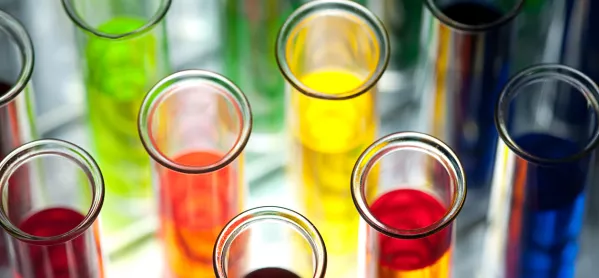Lack of relevant role models combined with fewer opportunities for practical work and extracurricular events are among the significant “barriers” preventing disadvantaged students from studying chemistry beyond the age of 16, according to scientists.
In the report Is Chemistry for All?, published today, the Royal Society of Chemistry (RSC) argues that disadvantaged pupils and BAME (black, Asian and minority-ethnic) girls are being held back from studying chemistry by misconceptions about career options and a lack of real-world application.
Related: GCSE science grades will be hit by Covid, say teachers
Comment: Could coronavirus change science education?
Testing: Ofsted links weak science scores to lack of KS2 testing
Sarah Robertson, director of education and professional practice at RSC, said: “Chemistry is essential to help solve global problems, and we need talented chemical scientists in all sectors from a diversity of backgrounds to make a difference to the world.
“Our report sets out the way the government, schools, parents and even employers can help remove these barriers that can prevent someone pursuing a career in chemistry and in doing so improving the diversity of the workforce.”
An outreach programme designed to overcome these barriers, called Chemistry for All, showed promising results, with a 46 per cent increase in interest in the subject in the 17 schools that received the programme compared with those which did not.
The RSC has also said it is releasing additional funds to schools and pupils hit hardest by the Covid-19 pandemic, prioritising those in less advantaged areas.
The report calls on teachers to tackle students’ misconceptions. For example, it says, teachers could use examples of people in chemistry who have “worked hard” rather than relied on “natural cleverness”, to help demystify the difficulty of the subject.
Also, it adds, it is vital to provide students with a range of role models (by age, gender, ethnicity, social background, etc) of successful chemistry professionals.
The RSC also makes the point that, while practical work is not the only way to bring chemistry to life, it is “pivotal” in ensuring students are engaged and see the subject’s real-world relevance.
It also calls on policymakers to ensure that the development of practical skills remains embedded in the curriculum, and that practical work in schools is supported and resourced.
Ms Robertson said: “We know that practical work - whether that’s in the classroom or through outreach activities - is pivotal to providing an inspirational chemistry education.
“The challenges for teachers and outreach providers in providing disadvantaged students with those hands-on, inspirational experiences are even greater when social distancing and remote teaching is factored in.”
These are concerns shared by science teachers and leaders, as found by a survey run by the Association for Science Education earlier this term.




